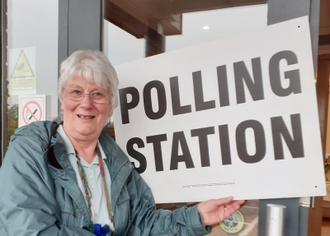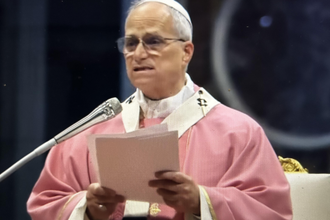Engaging with election candidates - Hustings

Sister Gillian Price FC
Sister Gillian Price FC writes:
When the date of the general election was announced Cardinal Vincent Nichols, President of the Catholic Bishops' Conference of England and Wales issued a message on YouTube, in which he said: "On 4th July the country will vote in the general election. I want to encourage all Catholics, especially young adults, to be active and engage with their candidates to ascertain their views on the key issues.".
One of the ways of engaging with candidates for an election is at a hustings where voters will have the chance to hear the views of (hopefully) all the candidates standing in the election.
For more than 45 years, churches across the country have joined together to run General Election Hustings meetings: public meetings where people can listen to and ask questions of the candidates who hope to represent them in the UK Parliament. Meetings sponsored by the churches provide opportunity for genuine political debate on neutral territory. I have attended many hustings organised by Churches together and I can vouch they are an excellent way of learning candidates views and letting them know the concerns of voters.
Drawing on my past experience I offer some practical tips to getting the most out of attending a hustings.
Asking a question
Sometimes you have to pre-submit a question. Many chairs of hustings like to group the questions together and make their own choices, but there is usually also a chance for people to ask questions from the floor. My feeling is that you have a better chance of getting your question as it stands if you are able to ask a question from the floor on the night, but better still, why not get one person to pre-submit a question and then another to be ready with their pre-written question to ask?
You are attending as a voter - the candidates all want your vote! Whoever is chairing the proceedings does not want any aggro from pressure groups, so is more likely to choose you to ask a question if you are not obviously representing a group, therefore, it can be good not wear any distinguishing clothes such as a T-shirt with a logo on.
If there is more than one of you, it's best not to sit together or be seen together. This multiplies your chance of getting your question answered. It's good to sit fairly near the front, but not the very front row as you are more likely to catch the eye of the Chair. I reckon the seat next to the middle aisle of the second row from the front is a good place!
Engaging with the candidates
Show an open, relaxed, interested face to all the questions, and smile if you can! This will identify you to the Chair as a reasonable person. Makes notes of all the candidates' replies to questions - this is how you learn about your next MP (as one of them is going to be elected), and they might say something which could be of use in future meetings with them, as you can quote their words back to them! It can be a good idea to divide the questions and answers up between you, as you can then concentrate on one question each.
Do try to talk to all the candidates you can after the meeting, especially the ones most likely to get elected. Introduce yourself and comment on anything you were particularly interested by. Make a note of the names of their support staff too, and get some contact details written down. This is useful information for the future. I have had a photo taken with one or two of them too. I remember on one memorable husting, Results UK asked us to ask the candidates to make a commitment to eradicating poverty, and we had a sheet with a slogan on that they could be photographed with. They all had their photos taken with the sheet.
At one hustings, the new Tory candidate (who was subsequently elected as MP) remembered my question on hustings night, and referred to it in the group's first meeting with her (via Zoom). Her comment on the merger of DfID (the former Department for International Development) and the Foreign Office was, "Gill's not going to like that" (having assured me at the hustings that no such merger was being contemplated!
My experience with hustings has usually been at those organised by groups such as Churches Together which are more friendly towards asking development questions and of Catholic Social Teaching. So please go along with friends from Church and let the candidates know what you think! Or better still why not ask your local Churches together if they will be organising a hustings?
Churches together website has a section where you can find an Churches together hustings in your constituency.
See: https://churcheselection.org.uk/eventsys_displayall.php
If there are no hustings planned for your constituency your Church can always organise its own!
The Churches together website also gives good guidance on how to organise your own hustings.
https://churcheselection.org.uk/pdf_view.php?id=1005
while other organisations give similar advice, here are a few websites:
Friends of the Earth: https://groups.friendsoftheearth.uk/elections/guide-planning-hustings
Right to Life: https://righttolife.org.uk/guide-on-how-to-run-a-hustings-event
The electoral commission: www.electoralcommission.org.uk/full-guidance/are-you-holding-a-hustings
Or if none of that is possible you can use Results UK guide to reaching all the Prospective Parliamentary Candidates in your local constituency, here: https://results.org.uk/news/a-summer-election/
In Fratelli Tutti Pope Francis asks us to have a 'heart open to the world' and asks that we engage in a 'better kind of politics. Let us hope that this general election will be a time when we all commit to the 'better kind of politics' One thing we can all do is to join Pope in prayer that we may all have a heart open to encounter.
Lord, Father of our human family,
you created all human beings equal in dignity:
pour forth into our hearts a fraternal spirit
and inspire in us a dream of renewed encounter,
dialogue, justice and peace.
Move us to create healthier societies
and a more dignified world,
a world without hunger, poverty, violence and war. Amen


















